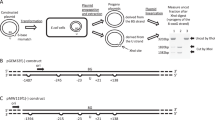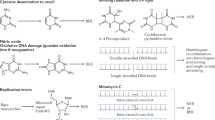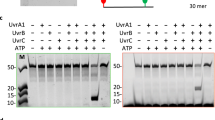Abstract
THE mutagenic lesion O6-methylguanine (O6-MeG) is slowly but actively removed from DNA in Escherichia coli cells treated with alkylating agents1. In bacteria exposed to sublethal concentrations of chemical mutagens such as N-methyl-N′-nitro-N-nitrosoguanidine (MNNG) or N- methyl -N-nitrosourea (MNUA), an apparently error-free repair system is induced that confers increased resistance to the mutagenic and lethal effects of challenge doses of the same or related compounds2–4. This adaptive response is associated with an increased ability of the induced E. coli to remove 06-MeG residues from their DNA (see ref. 5 and preceding paper6). We have investigated the action of cell-free extracts from adapted E. coli on DNA containing O6-MeG residues. Here we report that O6-MeG disappears from alkylated DNA after incubation with a crude enzyme fraction from adapted cells, although no concomitant release of the methyl group or the alkylated base or nucleotide occurs. Instead, this process is due to a previously unrecognised DNA repair mechanism involving enzyme-catalysed structural alteration of the alkylated residue.
This is a preview of subscription content, access via your institution
Access options
Subscribe to this journal
Receive 51 print issues and online access
$199.00 per year
only $3.90 per issue
Buy this article
- Purchase on Springer Link
- Instant access to full article PDF
Prices may be subject to local taxes which are calculated during checkout
Similar content being viewed by others
References
Lawley, P. D. & Orr, D. J. Chem.-biol. Interact. 2, 154–157 (1970).
Samson, L. & Cairns, J. Nature 267, 281–283 (1977).
Jeggo, P., Defais, M., Samson, L. & Schendel, P. Molec. gen. Genet. 157, 1–9 (1977); 162, 299–305 (1978).
Schendel, P. F., Defais, M., Jeggo, P., Samson, L. & Cairns, J. J. Bact. 135, 466–475 (1978).
Schendel, P. F. & Robins, P. E. Proc. natn. Acad. Sci. U.S.A. 75, 6017–6020 (1978).
Robins, P. & Cairns, J. Nature 279, 74–76 (1979).
Riazuddin, S. & Lindahl, T. Biochemistry 17, 2110–2118 (1978).
Singer, B. Nature 264, 333–339 (1976).
Kirtikar, D. M. & Goldthwait, D. A. Proc. natn. Acad. Sci. U.S.A. 71, 2022–2026 (1974).
Pegg, A. E. Biochem. biophys. Res. Commun. 84, 166–173 (1978).
Jeggo, P. J. Bact. (submitted).
Author information
Authors and Affiliations
Rights and permissions
About this article
Cite this article
KARRAN, P., LINDAHL, T. & GRIFFIN, B. Adaptive response to alkylating agents involves alteration in situ of O6-methylguanine residues in DNA. Nature 280, 76–77 (1979). https://doi.org/10.1038/280076a0
Received:
Accepted:
Issue Date:
DOI: https://doi.org/10.1038/280076a0
Comments
By submitting a comment you agree to abide by our Terms and Community Guidelines. If you find something abusive or that does not comply with our terms or guidelines please flag it as inappropriate.



